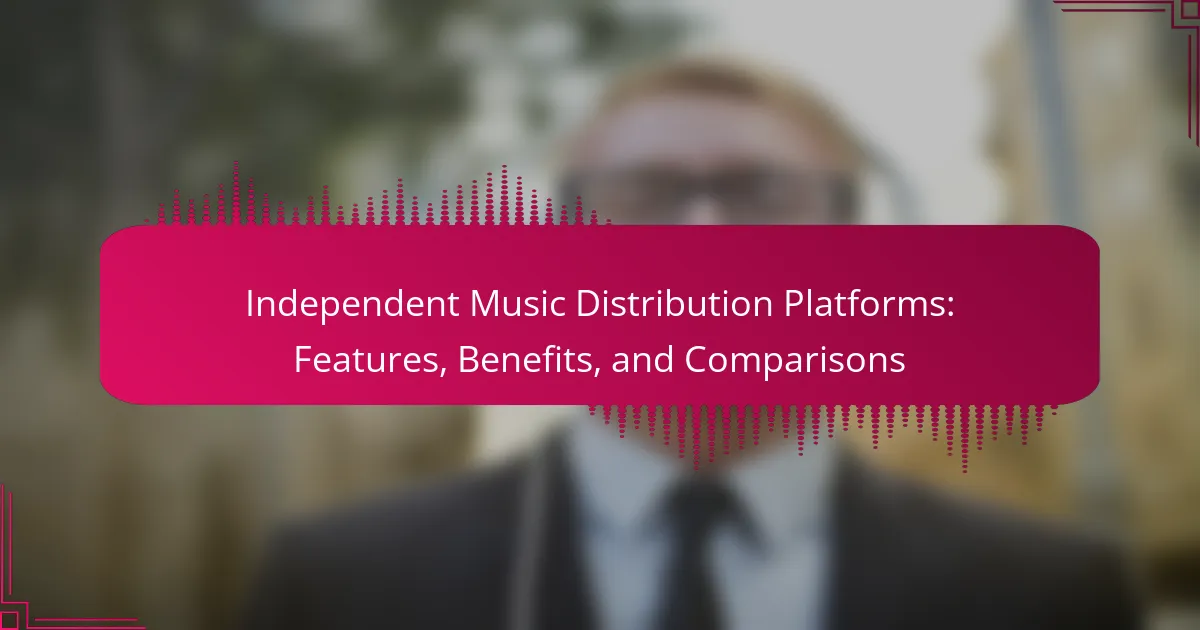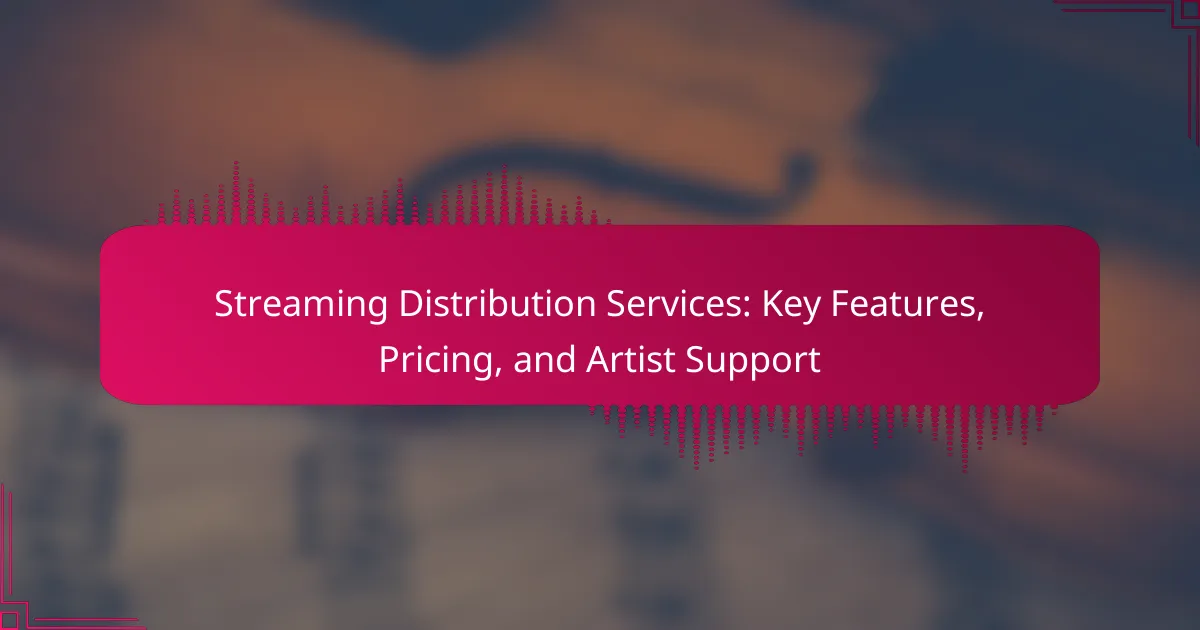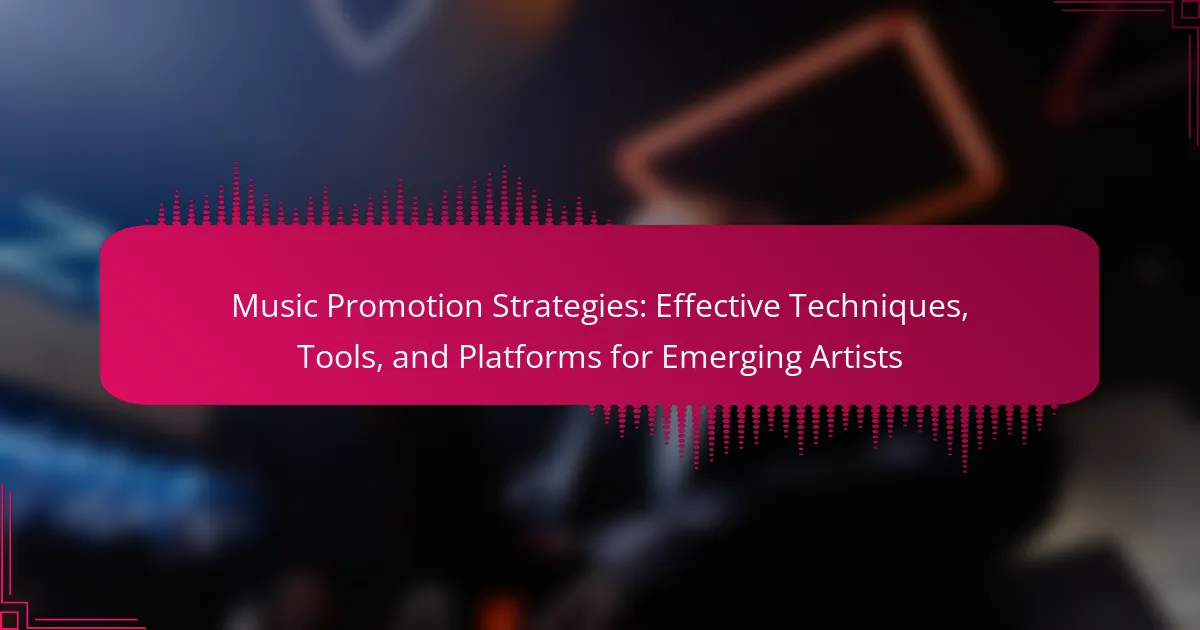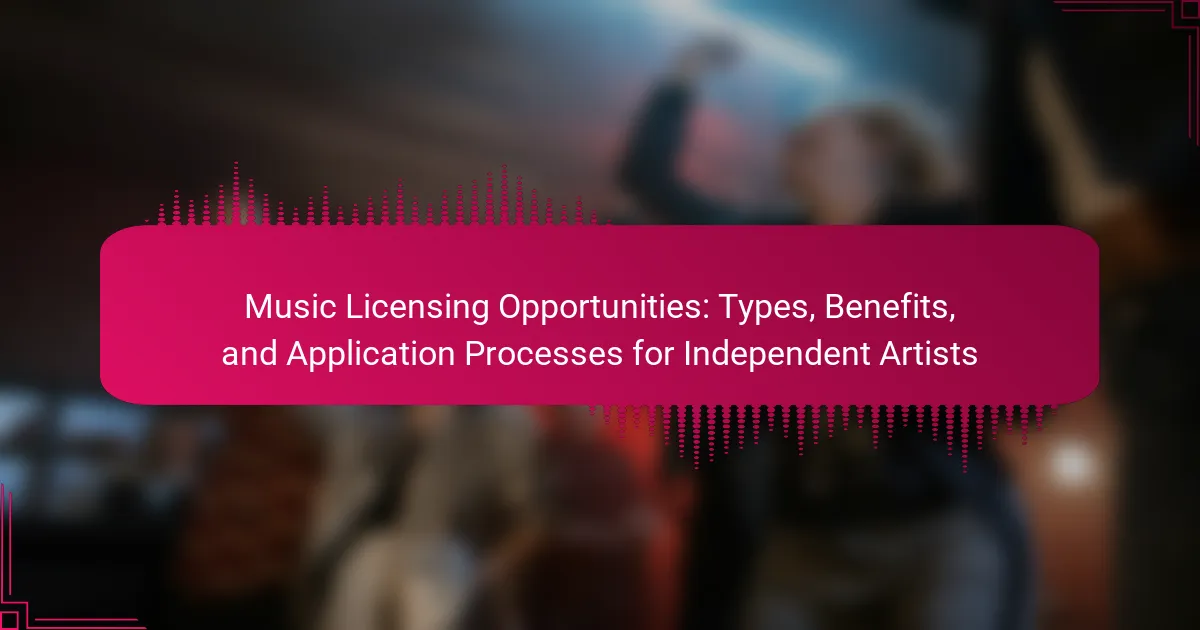Effective music promotion campaigns are crucial for artists aiming to increase visibility and engagement. This article covers planning clear objectives, identifying target audiences, selecting promotional channels, creating engaging content, and measuring success through key metrics. Understanding these components will help artists navigate the competitive landscape and optimize their promotional efforts.
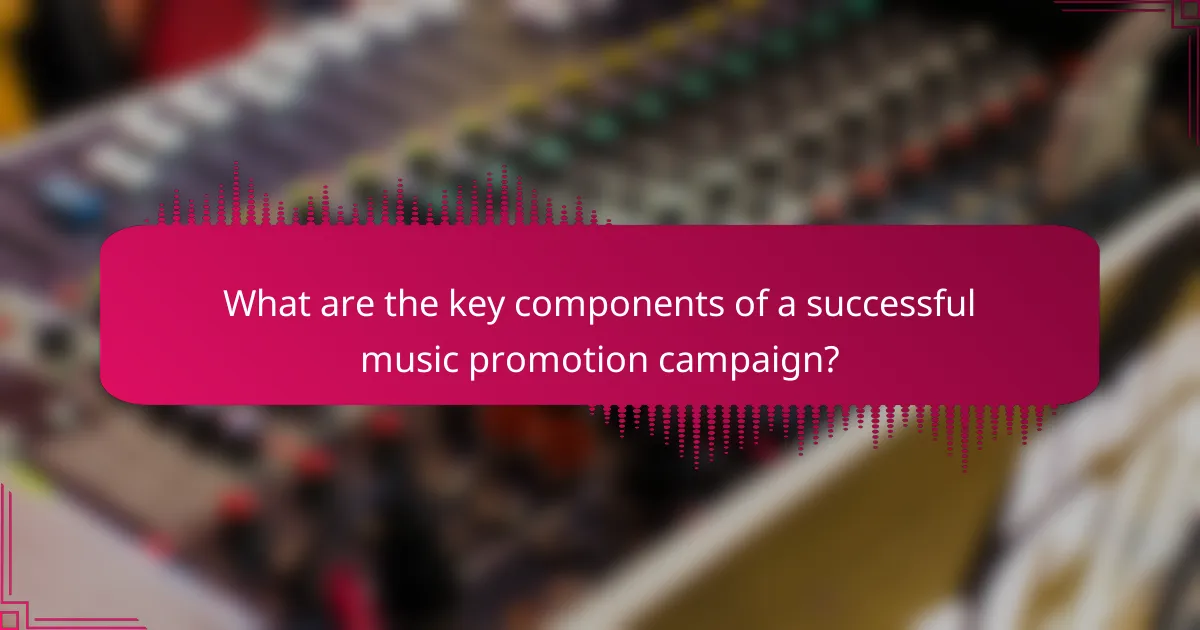
What are the key components of a successful music promotion campaign?
A successful music promotion campaign includes strategic planning, targeted execution, and thorough measurement of success. Key components are defining goals, identifying the target audience, selecting appropriate channels, and creating engaging content.
1. Define clear objectives: Establish what you want to achieve, such as increasing streams, growing fan engagement, or boosting ticket sales.
2. Identify the target audience: Understand demographics, preferences, and behaviors to tailor your messaging effectively.
3. Choose promotional channels: Utilize social media, email marketing, and collaborations to maximize reach.
4. Create compelling content: Develop high-quality visuals, videos, and storytelling elements that resonate with your audience.
5. Monitor and analyze performance: Use analytics tools to track progress and adjust strategies based on data insights.
How do target audience demographics influence campaign strategies?
Target audience demographics significantly shape music promotion campaign strategies by determining message tailoring and channel selection. Understanding age, location, and preferences allows for targeted content that resonates with specific groups. For instance, younger audiences may favor social media platforms, while older demographics might respond better to traditional media. Campaigns that align with audience characteristics tend to achieve higher engagement and conversion rates. Analyzing demographic data can reveal unique insights into music genre popularity, influencing promotional efforts and resource allocation.
Which platforms are most effective for music promotion in 2025?
Social media platforms, streaming services, and music blogs are the most effective for music promotion in 2025. Social media enables direct engagement with fans, while streaming services offer broad reach and analytics. Music blogs provide credibility and targeted exposure. Each platform plays a unique role in maximizing visibility and audience connection.
What role do social media channels play in music marketing?
Social media channels are essential for music marketing as they enhance audience engagement and increase visibility. They allow artists to share content directly with fans and promote new releases. Platforms like Instagram and TikTok facilitate viral marketing through user-generated content, amplifying reach. Additionally, analytics from these channels help measure campaign success, providing insights into audience preferences and engagement levels.
How can collaborations enhance music promotion efforts?
Collaborations significantly enhance music promotion efforts by expanding reach and engaging diverse audiences. Partnering with other artists or brands creates unique content and cross-promotion opportunities. This strategy increases visibility, fosters community engagement, and can lead to higher streaming numbers and sales. For example, joint performances or social media campaigns can tap into each collaborator’s fan base, amplifying promotional impact.
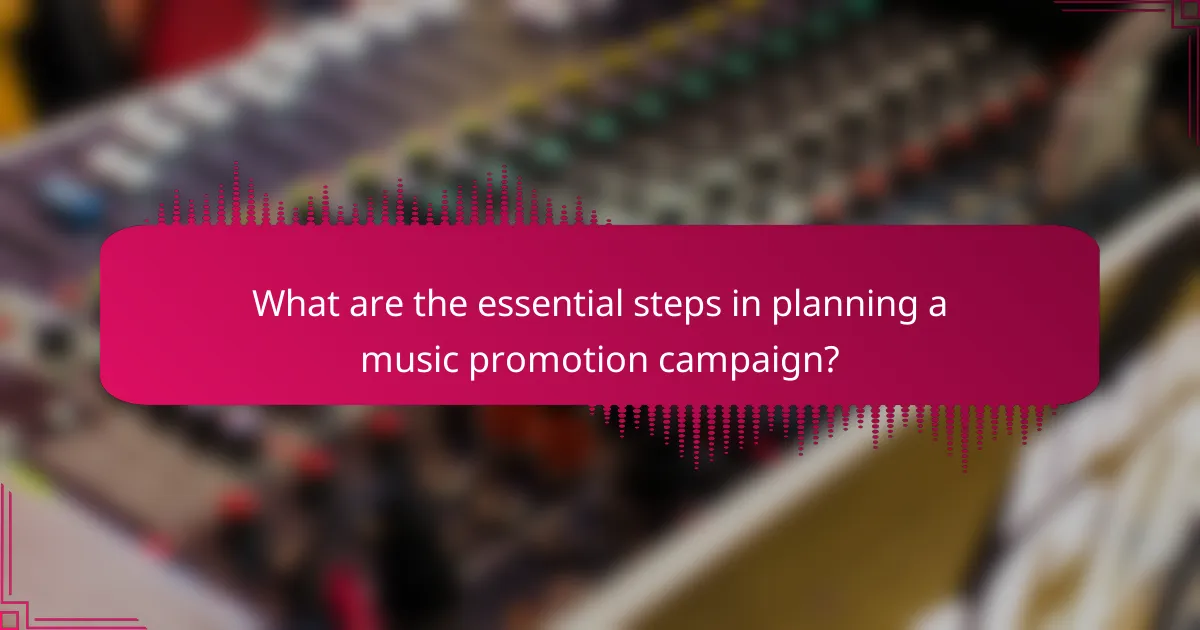
What are the essential steps in planning a music promotion campaign?
The essential steps in planning a music promotion campaign include defining goals, identifying the target audience, selecting promotional channels, creating engaging content, and measuring success. These steps ensure a structured approach to effectively reach and engage listeners.
1. Define goals: Establish clear objectives, such as increasing streams or gaining followers.
2. Identify target audience: Research demographics and preferences to tailor the campaign.
3. Select promotional channels: Choose platforms like social media, email, or music blogs for outreach.
4. Create engaging content: Develop high-quality visuals, videos, and messaging that resonate with the audience.
5. Measure success: Use analytics tools to track performance and adjust strategies as needed.
How do you define campaign goals and objectives?
Define campaign goals as specific outcomes you want to achieve, while objectives are measurable steps to reach those goals. For music promotion campaigns, clearly outlined goals could include increasing brand awareness, boosting streaming numbers, or enhancing audience engagement. Objectives may involve setting a target of 10,000 new followers on social media within three months or achieving 1 million streams on a new release within six weeks. Establishing these metrics provides clarity and direction, ensuring effective planning and execution.
What budgeting considerations are critical for music campaigns?
Budgeting considerations for music campaigns include defining clear objectives, allocating funds for promotion channels, and measuring return on investment. Prioritize essential expenses such as artist fees, marketing materials, and digital advertising. Assess potential revenue streams like ticket sales and merchandise to ensure financial viability. Regularly review budget performance to adapt strategies effectively.
How do you create a comprehensive promotional timeline?
To create a comprehensive promotional timeline for music promotion campaigns, outline key milestones and deadlines. Start by defining the campaign’s goals and audience.
1. Set a launch date for the campaign.
2. Identify major promotional activities, such as social media announcements, press releases, and events.
3. Schedule content creation and distribution, including music videos and promotional materials.
4. Allocate time for engagement metrics review to measure success and adjust strategies.
This structured approach ensures that all elements of the campaign are organized and executed effectively.
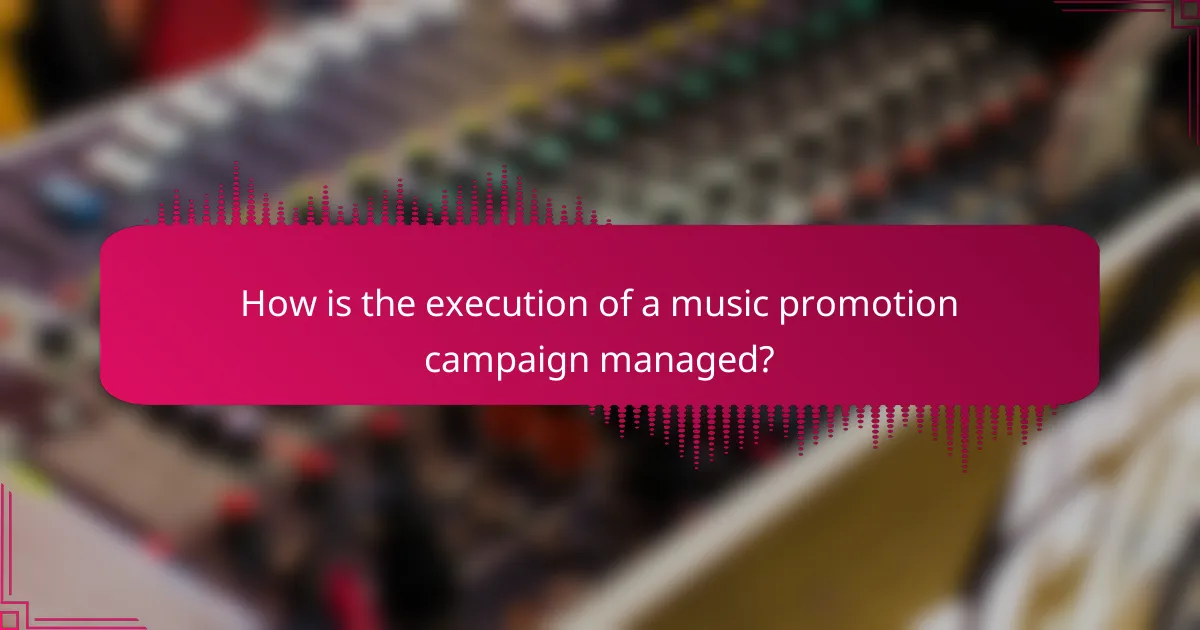
How is the execution of a music promotion campaign managed?
The execution of a music promotion campaign is managed through strategic planning, targeted outreach, and performance analysis. First, define clear objectives such as audience growth or sales increase. Next, develop a detailed timeline that includes promotional activities across various channels like social media, email, and live events. Allocate resources effectively, ensuring that the team is equipped to handle tasks such as content creation, audience engagement, and analytics.
Monitoring key performance indicators (KPIs) like engagement rates and conversion metrics is essential. This data helps refine strategies in real-time, ensuring the campaign remains effective. Adjustments based on audience feedback and performance can enhance overall success.
What tools and technologies support campaign execution?
Music promotion campaigns utilize various tools and technologies for effective execution. Key tools include social media platforms, email marketing software, and analytics tools. Social media platforms like Facebook and Instagram enable targeted outreach, while email marketing software helps maintain direct communication with fans. Analytics tools measure campaign performance, providing insights into engagement and reach. Additionally, content management systems streamline the process of sharing music and promotional materials. Using these technologies enhances campaign efficiency and effectiveness.
How do you ensure consistent messaging across channels?
Consistent messaging across channels is ensured by establishing clear guidelines and maintaining a unified brand voice. Start by developing a comprehensive messaging framework that outlines key messages, tone, and visual elements. Regularly review and update this framework to adapt to changing market conditions. Utilize centralized communication tools to share updates with all team members, ensuring alignment. Monitor and analyze audience feedback to refine messaging strategies across platforms.
What are the best practices for engaging with fans during a campaign?
Engaging with fans during a music promotion campaign requires authentic interaction and consistent communication. Utilize social media platforms to create polls, share behind-the-scenes content, and host live Q&A sessions. Prioritize responding to fan comments and messages, fostering a sense of community. Collaborate with influencers to expand reach and encourage user-generated content for deeper engagement. Regularly analyze feedback to adapt strategies and enhance fan experiences.
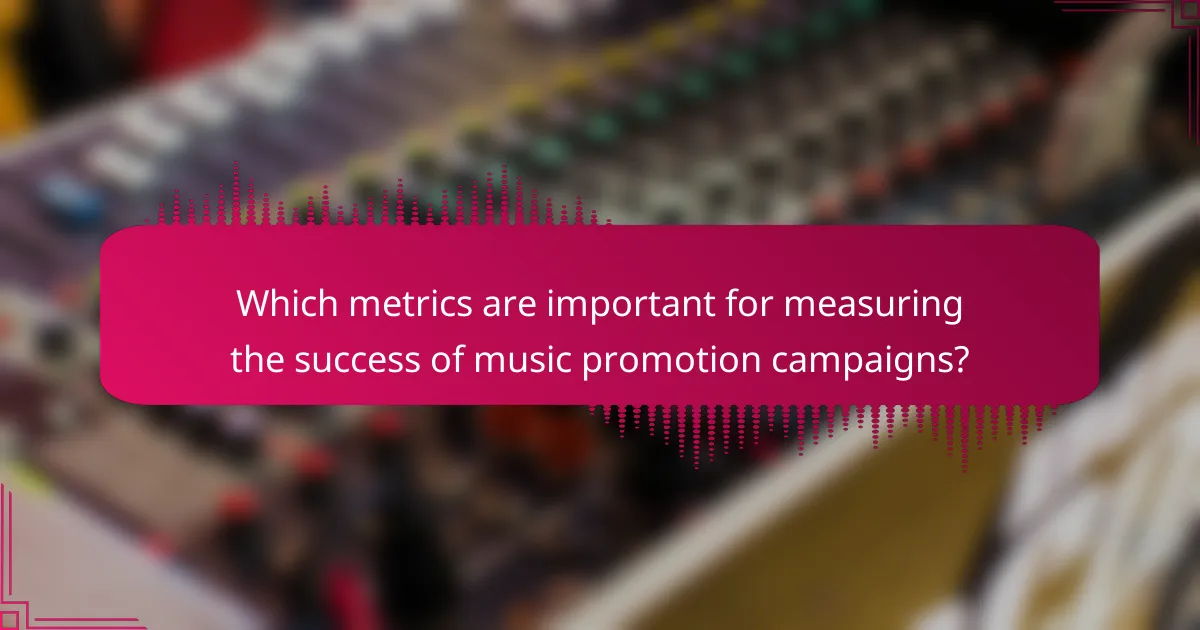
Which metrics are important for measuring the success of music promotion campaigns?
Key metrics for measuring the success of music promotion campaigns include engagement rates, conversion rates, reach, and return on investment. These metrics provide insights into audience interaction and campaign effectiveness.
Engagement rates reflect how well the audience responds to content, often measured through likes, shares, and comments. Conversion rates track the percentage of users who take desired actions, such as streaming or purchasing music. Reach indicates the total number of unique users exposed to the campaign, while return on investment assesses the financial effectiveness of promotional efforts.
Monitoring these metrics allows artists and promoters to refine strategies and achieve better results in future campaigns.
How do you assess audience engagement and reach?
To assess audience engagement and reach in music promotion campaigns, use analytics tools to track metrics. Key indicators include social media interactions, streaming counts, and email open rates. Engagement can be measured through likes, shares, and comments across platforms. Reach is evaluated by monitoring follower growth and audience demographics.
What role do sales and streaming statistics play in evaluating success?
Sales and streaming statistics are vital for evaluating the success of music promotion campaigns. They provide quantifiable metrics that reflect audience engagement and market reach. High streaming numbers indicate popularity and can enhance an artist’s visibility. Sales figures directly impact revenue and can signify the effectiveness of promotional efforts. Analyzing these statistics helps refine future campaigns and target specific demographics effectively.
How can feedback and analytics inform future campaigns?
Feedback and analytics are essential for refining music promotion campaigns. Analyzing audience engagement and campaign performance helps identify effective strategies and areas for improvement. This data-driven approach enables targeted adjustments to maximize reach and impact. For instance, tracking social media interactions reveals which content resonates most, guiding future creative decisions. Additionally, metrics like streaming numbers and ticket sales provide concrete evidence of campaign success, informing budget allocation and promotional tactics. Ultimately, leveraging feedback and analytics creates a cycle of continuous improvement, enhancing overall campaign effectiveness.
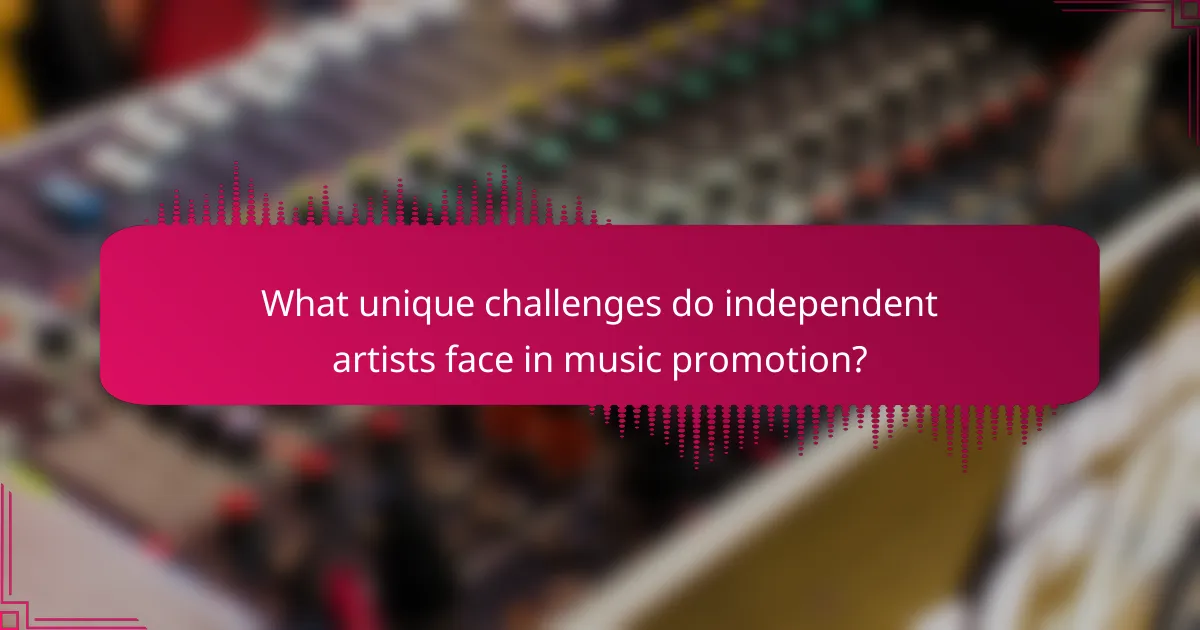
What unique challenges do independent artists face in music promotion?
Independent artists face unique challenges in music promotion due to limited resources and visibility. They often struggle with budget constraints, making it difficult to access professional marketing tools and services. Building an audience without major label support is challenging, requiring innovative strategies and strong social media engagement. Additionally, navigating the competitive landscape of music promotion can be overwhelming, as many artists lack the industry connections that facilitate exposure. These factors combined create significant barriers for independent artists aiming to achieve success in a crowded market.
How can independent artists leverage grassroots marketing strategies?
Independent artists can effectively leverage grassroots marketing strategies by engaging directly with their local communities and utilizing social media. Building personal connections fosters loyalty and encourages word-of-mouth promotion.
Artists should organize local events, such as open mics or listening parties, to showcase their music and connect with fans. Collaborating with other local artists can expand their audience and create a supportive network.
Utilizing social media platforms allows artists to share their journey, promote upcoming shows, and interact with followers. Regular updates and behind-the-scenes content enhance engagement and build a dedicated fan base.
Tracking success through metrics like social media engagement and attendance at events helps refine strategies. This data-driven approach enables artists to adjust their marketing efforts for better results.
What are the benefits and drawbacks of DIY promotion versus professional services?
DIY promotion offers cost savings and creative control, while professional services provide expertise and wider reach. Each approach has distinct benefits and drawbacks that can impact the success of music promotion campaigns.
DIY promotion allows artists to engage directly with their audience, fostering a personal connection. However, it may lack the strategic insight that experienced professionals bring. Professional services can leverage established networks and industry knowledge, but they often require a significant financial investment.
In summary, the choice between DIY and professional services hinges on budget, desired control, and the artist’s marketing skills. Balancing these factors can lead to a more effective promotion strategy.
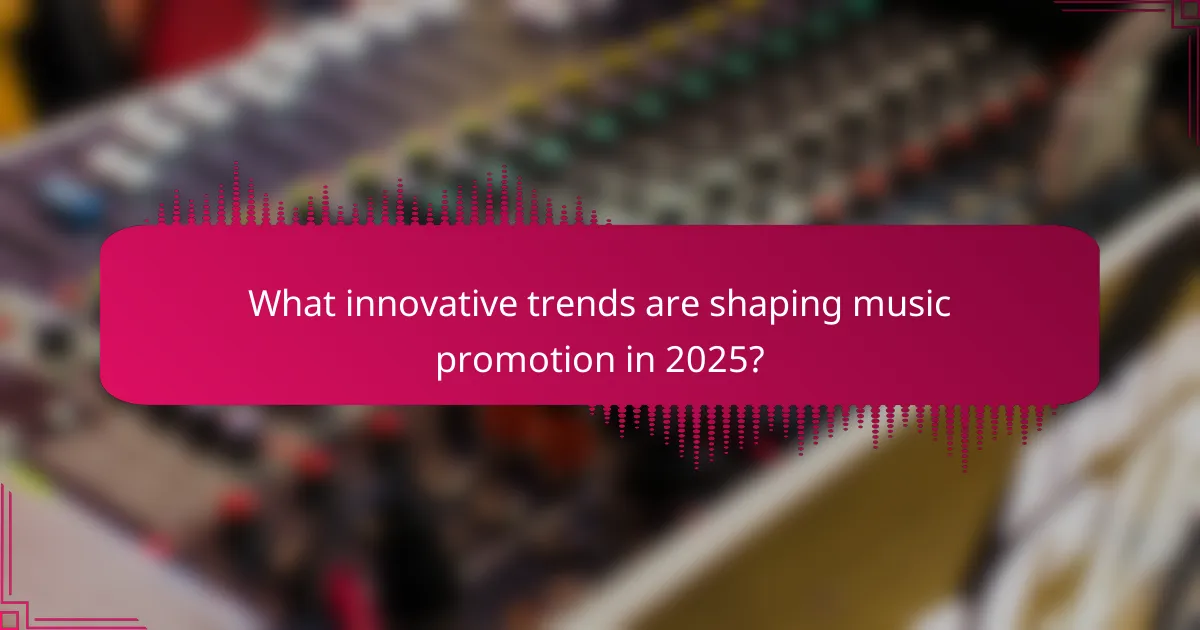
What innovative trends are shaping music promotion in 2025?
Innovative trends shaping music promotion in 2025 include advanced data analytics, personalized marketing strategies, and immersive experiences. These trends enhance audience engagement and campaign effectiveness.
Data analytics enables artists to understand listener behavior, tailoring promotions to specific demographics. Personalized marketing leverages AI to create targeted campaigns, increasing relevance and reach. Immersive experiences, such as virtual concerts and augmented reality, offer unique interactions, fostering deeper connections with fans.
As a result, music promotion campaigns will become more efficient and impactful, driving higher success rates in reaching and engaging audiences.
How do virtual events and live streaming alter promotional strategies?
Virtual events and live streaming significantly enhance promotional strategies for music campaigns. They allow artists to reach wider audiences, engage fans in real-time, and create immersive experiences.
By leveraging platforms like YouTube and Twitch, musicians can host live performances, Q&A sessions, and exclusive events, driving engagement and interaction. This shift enables targeted marketing, as data analytics can track viewer behavior and preferences.
Additionally, virtual events reduce costs associated with physical venues and logistics, allowing for more budget allocation towards creative marketing efforts. The ability to collaborate with influencers and brands in a virtual setting also expands promotional reach.
Overall, the integration of live streaming into music promotion fosters innovation and adaptability in reaching and connecting with audiences.
What impact does data-driven marketing have on music promotion?
Data-driven marketing significantly enhances music promotion by enabling targeted strategies and measurable outcomes. It allows artists and labels to analyze audience behavior, optimize campaigns, and improve engagement. By leveraging data analytics, promoters can identify trends and preferences, ensuring that marketing efforts resonate with the intended audience. This approach leads to higher conversion rates and more effective allocation of resources. Additionally, data-driven insights facilitate real-time adjustments to campaigns, maximizing their impact and reach.
Which emerging technologies are influencing music marketing?
Emerging technologies significantly influence music marketing by enhancing engagement and targeting. Social media algorithms, data analytics, and artificial intelligence enable personalized promotion strategies. Blockchain technology offers transparency in royalties, while virtual reality creates immersive experiences for fans. These innovations reshape how artists connect with audiences and measure campaign effectiveness.
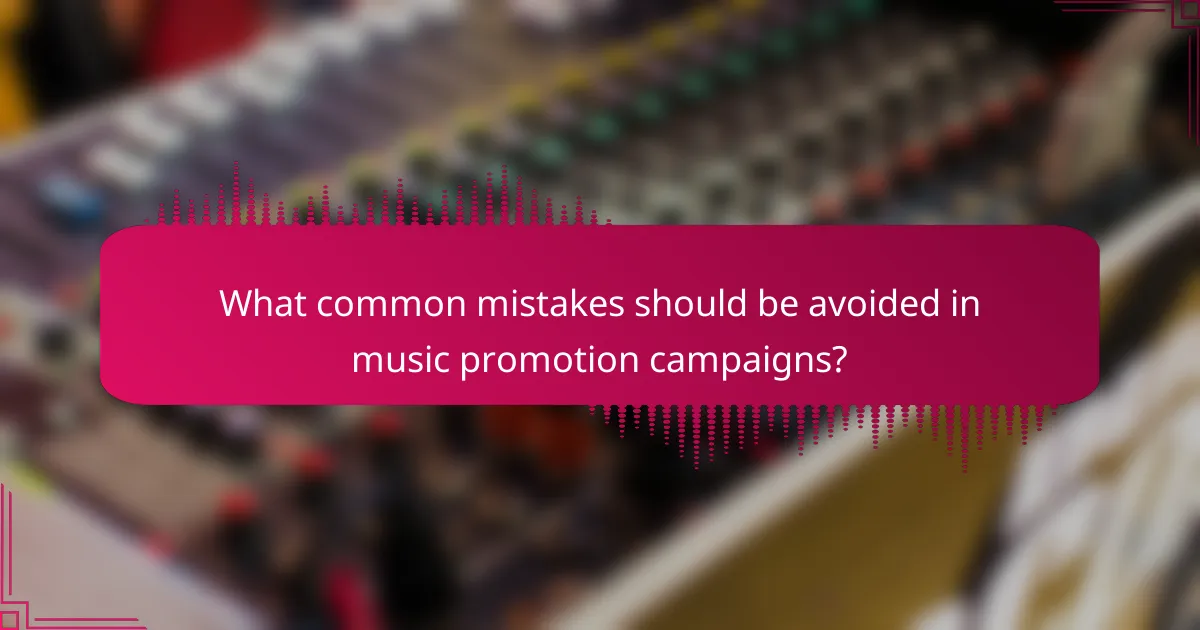
What common mistakes should be avoided in music promotion campaigns?
To avoid common mistakes in music promotion campaigns, focus on clear goals, target audience engagement, and consistent messaging.
Firstly, neglecting to define specific objectives can lead to ineffective strategies. Secondly, failing to understand the target audience may result in misaligned promotional efforts. Thirdly, inconsistent messaging across platforms can confuse potential listeners. Additionally, overlooking analytics can hinder the ability to measure success and adjust tactics. Finally, not leveraging social media effectively can limit reach and engagement.
How can poor targeting affect campaign outcomes?
Poor targeting can significantly undermine campaign outcomes by misaligning content with the intended audience. This can result in low engagement rates, wasted budget, and diminished brand reputation. When campaigns fail to reach the right demographic, the messaging becomes irrelevant, leading to missed opportunities for conversions. Effective targeting enhances campaign precision, ensuring resources are allocated efficiently and maximizing return on investment.
What are the risks of neglecting post-campaign analysis?
Neglecting post-campaign analysis can lead to missed opportunities for improvement and wasted resources. Without evaluating performance metrics, marketers cannot identify successful strategies or areas needing adjustment. This oversight can hinder future campaign effectiveness and reduce return on investment. Additionally, failing to analyze audience engagement may result in misalignment with target demographics, impacting brand growth.
How can over-reliance on a single platform hinder success?
Over-reliance on a single platform can significantly hinder success in music promotion campaigns. Diversification across multiple channels enhances reach and engagement. Relying solely on one platform limits audience exposure and reduces the effectiveness of promotional strategies. This can lead to missed opportunities for connecting with diverse listener demographics. Additionally, algorithm changes on a single platform can drastically impact visibility, making it crucial to maintain a presence across various platforms for sustained success.
What are the best practices for optimizing music promotion campaigns?
To optimize music promotion campaigns, focus on clear goals, target audience insights, and measurable metrics. Identify your objectives, such as increasing streams or engagement. Utilize social media platforms effectively to reach your audience. Collaborate with influencers to expand your reach. Track performance through analytics to refine strategies. Adjust campaigns based on feedback and results for continuous improvement.
